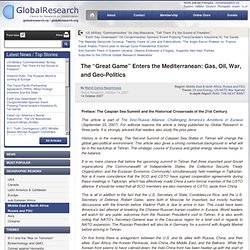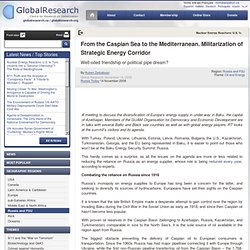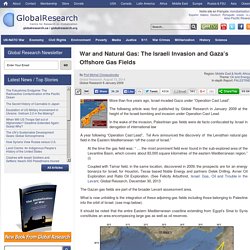

CHINA’S STRATEGIC SHIFT TOWARD THE REGION OF THE FOUR SEAS: THE MIDDLE KINGDOM ARRIVES IN THE MIDDLE EAST. Since the Arab Spring, China has been quietly asserting its influence and fortifying its foothold in the Middle East, while the United States pivots to the Asia Pacific after a decade of war. It is aligning with states that have problematic relations with the West and are also geo-strategically placed on the littoral of the “Four Seas”–the Caspian Sea, Black Sea, Mediterranean Sea, and Arabian Sea/Persian Gulf. Paradoxically, the U.S. eastward pivot is matched by the resurgent Middle Kingdom’s westward pivot across its new Silk Road, and threatens to outflank the citadel of American geo-strategies in the region. Energy Security China’s interest in the Middle East is first and foremost energy-driven. [1] In 1993, when it became a net oil importer for the first time, Beijing embarked on a “go out” ( zhouchuqu ) policy to procure energy assets abroad to feed its growing economy.
Market Access Strategic Foothold Post Arab Spring Economic Tool Political Tool UN Security Council Vote Military Tool. CHINA, IRAN, AND NORTH KOREA: A TRIANGULAR STRATEGIC ALLIANCE. Introduction: Iran in China’s Strategic Calculus There is a paucity of research on Sino-Iran relations in the international security literature, yet this relationship has important implications for East Asia and Middle East regional security.

Historically, Sino-Iran relations span back thousands of years, and their modern partnership began in the 1970s, first with the Shah and then continuing with the Islamic Republic of Iran. The Sino-Soviet split in the 1960s, coupled with the Shah’s fear of Soviet misadventures in Iran and the Gulf, paved way for Sino-Iran rapprochement. China’s Persian Gulf Strategy In 1993, China became a net importer of oil and is now the second biggest energy consumer in the world, after the United States. Iran-Iraq War China’s Persian Gulf Strategy of aligning with Iran played out during the 1980-1988 Iran-Iraq War. Nuclear Iran China’s Persian Gulf strategy is continuing to be played out in the current stalemate over Iran’s illicit nuclear program. The “Great Game” Enters the Mediterranean: Gas, Oil, War, and Geo-Politics. Preface: The Caspian Sea Summit and the Historical Crossroads of the 21st Century This article is part of The Sino-Russia Alliance: Challenging America’s Ambitions in Eurasia (September 23, 2007).

For editorial reasons the article is being published by Global Research in three parts. It is strongly advised that readers also study the prior piece. From the Caspian Sea to the Mediterranean. Militarization of Strategic Energy Corridor. A meeting to discuss the diversification of Europe’s energy supply in under way in Baku, the capital of Azerbaijan.

Members of the GUAM Organisation for Democracy and Economic Development are in talks with several Baltic and Black sea countries as well as with global energy players. RT looks at the summit’s visitors and its agenda. Syria's Pipelineistan war - Opinion. Deep beneath "Damascus volcano" and "the battle of Aleppo", the tectonic plates of the global energy chessboard keep on rumbling.

Beyond the tragedy and grief of civil war, Syria is also a Pipelineistan power play. More than a year ago, a $10 billion Pipelineistan deal was clinched between Iran, Iraq and Syria for a natural gas pipeline to be built by 2016 from Iran's giant South Pars field, traversing Iraq and Syria, with a possible extension to Lebanon. Key export target market: Europe. During the past 12 months, with Syria plunged into civil war, there was no pipeline talk. Up until now. It gets more complicated. Try to bypass Ankara in this game, and you're in trouble. I went down to the crossroads Syria is not a major oil producer; its reserves are dwindling. Syria is way more important as an energy crossroads, much like Turkey - but on a smaller scale. Then all hell broke loose. War and Natural Gas: The Israeli Invasion and Gaza’s Offshore Gas Fields.
More than five years ago, Israel invaded Gaza under “Operation Cast Lead”.

The following article was first published by Global Research in January 2009 at the height of the Israeli bombing and invasion under Operation Cast Lead. In the wake of the invasion, Palestinian gas fields were de facto confiscated by Israel in derogation of international law A year following “Operation Cast Lead”, Tel Aviv announced the discovery of the Leviathan natural gas field in the Eastern Mediterranean “off the coast of Israel.” At the time the gas field was: “ … the most prominent field ever found in the sub-explored area of the Levantine Basin, which covers about 83,000 square kilometres of the eastern Mediterranean region.” (i) Coupled with Tamar field, in the same location, discovered in 2009, the prospects are for an energy bonanza for Israel, for Houston, Texas based Noble Energy and partners Delek Drilling, Avner Oil Exploration and Ratio Oil Exploration.
Michel Chossudovsky, January 3, 2014 Map 1 Map 2.